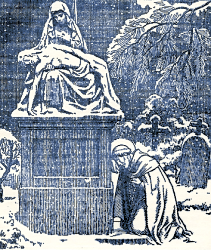Lives of the Saints
Our Models and Protectors
Spiritual Bouquet:
November 14

Saint Josaphat
Archbishop and Martyr
(1584-1623)
Born in 1584 in Vladimir, a city of ancient Poland, Saint Josaphat was the son of Gabriel Kuncewicz. His was a family of honorable Christians of the Greco-Slavic rite, in use among the Russians. His mother took care to raise him in the fear of God, and in his tender heart formed the first longings for virtue. He was never in any way lightheaded, but separated willingly from the games of his companions to pray. He made excellent progress in his studies, always preferring the sacred branches to the profane, and for thirty years he recited each day, without ever failing even once to do so, a large section of the Divine Office which he learned by heart.
At twenty years of age Josaphat deplored the situation of religion in Poland. In 1596, the Ruthenian Church was divided into two contending parties — the Unionates and those who persevered in schism. He saw divisions growing in the Church, and that few were remaining faithful to the Holy See, to safeguard the true orthodoxy and their eastern rites. He studied philosophy and theology under two famous Jesuits, and decided to enter religious life. When his employer, who was childless and wished to keep him, offered him his commerce as his adopted son, he declined that offer without hesitating, and entered the Convent of the Trinity at Vilna, where Basilian religious submissive to the Holy See were residing. He received the religious habit and was professed in 1604.
Saint Josaphat was ordained a priest and began to preach in various churches of the city, bringing back many dissidents to the Union. He was invited also to preach and govern in various regions of the land; he accepted to become head of a monastery at Bytene. He restored there celebrated sanctuaries, built a convent, and converted, among others, one of the most zealous of the dissidents. In 1614 Josaphat's friend Joseph Routski became Archbishop of the city of Vilna, and recalled his holy former companion to that city, confiding the monastery of the Trinity to him. Saint Josaphat never made harsh reproaches, but corrections warmed by a wholly paternal affection. The conversion of the separated brethren continued through the preaching of the one called by the Uniates The Scourge of the Schismatics, whereas the latter called him The Ravisher of Souls.
He became the Archbishop of Polotsk in 1617 at the age of thirty-eight, on the very day when, six years later, he would earn the consecration of blood, November 12th. He restored five major cathedrals and several lesser ones; he aided the poor, stripping himself often of the most necessary objects or funds. He maintained total frugality in his residence; he recovered certain properties retained unjustly by powerful lords of the region, through his mildness of language in the lawcourts, to which he had recourse for that purpose. But he was soon to acquire, in a certain Melece Smotritski, a formidable enemy, who had himself consecrated, in Russia, Archbishop of the same city as Josaphat, with other aspirants to like authority. Despite the opposition of King Sigismond of Poland, who forbade all his subjects to have any communication with the usurper, the latter won adherents. The people of the city of Vitebsk, a little like those of Jerusalem, who in one week's time changed their hosanna's into tolle's, turned toward the newcomers in large numbers, and in an uprising succeeded in giving eighteen wounds to the head of the Archdeacon of the church, and leaving for dead another official, bathed in his blood.
When their Archbishop went there to calm the tumult in 1623, knowing well that his hour had come, in effect he was most cruelly assassinated and his body profaned; he was in his forty-fourth year. His mortal remains were recovered after five days from the waters of a river, and exposed for nine days, constantly emitting a fragrance of roses and lilies. A councillor of Polotsk, where the body was returned, abandoned the schism merely at the sight of the archbishop's beautiful countenance. Many of the parricides struck their breasts, and did likewise. The Archbishop had gone gladly to his death, offering his life that the schism might end; he had said as much beforehand. Four years after his death the author of the troubles, Smotritski, the false archbishop, after many combats made a decisive step and consecrated his life to penance, prayer and the defense of the Union. Such changes of heart are indeed the greatest of miracles, won by the sanctity of the true servants of God.
About five years after Saint Josaphat's martyrdom his body was found intact, though the clothing had rotted away. Again in 1637 it was still white and supple. A beautiful silver reliquary was made for it, with a life-size image of the reclining Saint surmounting it. The body was again exposed intact in 1767. It was eventually taken to the Basilica of Saint Peter in Rome. Pope Pius IX canonized Saint Josaphat in 1867.
The Incorruptibles, by Joan Carroll Cruz (Tan Books and Publishers: Rockford, 1977); Les Petits Bollandistes: Vies des Saints, by Msgr. Paul Guérin (Bloud et Barral: Paris, 1882), Vol. 13